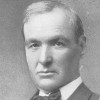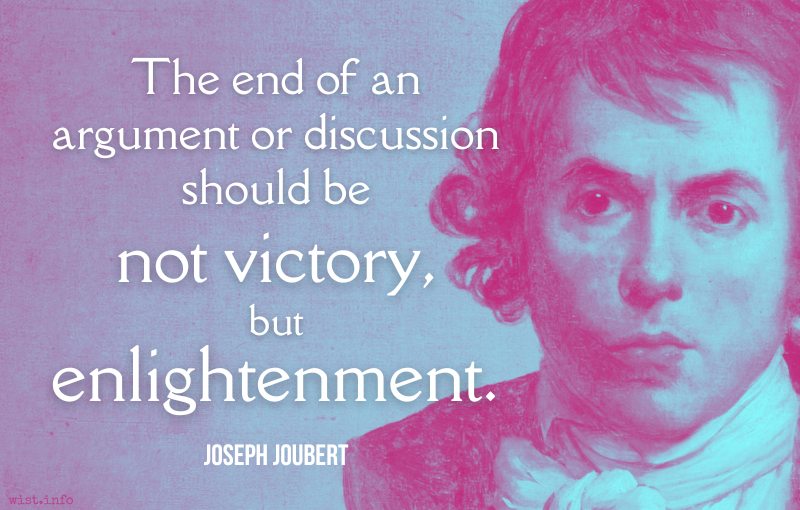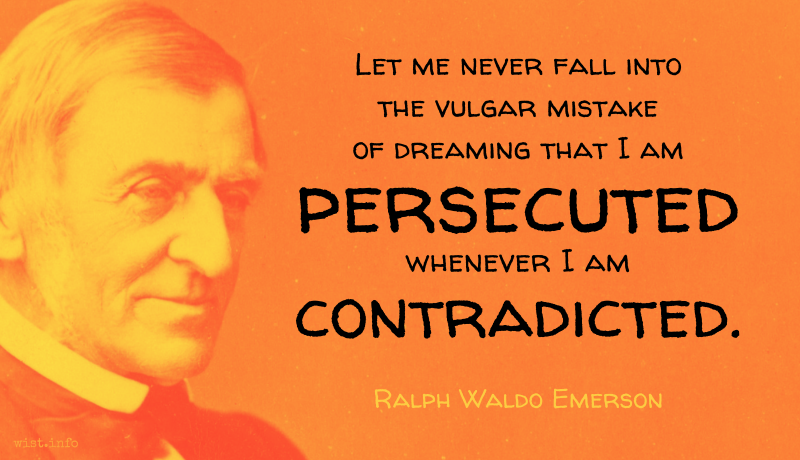Every day I add to the list of things I refuse to discuss. The wiser the man, the longer the list.
[Tous les jours j’accrois la liste des choses dont je ne parle plus. Le plus philosophe est celui dont la liste est la plus longue.]
Nicolas Chamfort (1741-1794) French writer, epigrammist (b. Nicolas-Sébastien Roch)
Products of Perfected Civilization [Produits de la Civilisation Perfectionnée], Part 2 “Characters and Anecdotes [Caractères et Anecdotes],” ch. 7 (1795) [tr. Parmée (2003)]
(Source)
Quoting someone reacting to a request to expound on "various public and private abuses" he had received.
(Source (French)). Alternate translation:
Every day I add to the list of things which I will no longer discuss. The more of a philosopher one is, the longer one's list.
[tr. Merwin (1969)]
Quotations about:
discussion
Note not all quotations have been tagged, so Search may find additional quotes on this topic.
Conversation is but carving;
Carve for all, yourself is starving:
Give no more to every Guest,
Than he’s able to digest;
Give him always of the Prime;
And but little at a Time.
Carve to all but just enough:
Let them neither starve nor stuff:
And, that you may have your Due,
Let your Neighbours carve for you.Jonathan Swift (1667-1745) English writer and churchman
“An Epistle to a Lady Who Desired the Author to Write Some Verses Upon Her in the Heroic Style,” ll. 123-132 (1732)
(Source)
Often rendered with the first line ending in an exclamation point, and the second line missing.
There is, incidentally, no way of talking about cats that enables one to come off as a sane person.
Dan Greenburg (1936-2023) American writer, humorist, journalist
In Bill Hayward, Cat People (1978)
(Source)
“What think you of books?” said he, smiling.
“Books — oh! no. I am sure we never read the same, or not with the same feelings.”
“I am sorry you think so; but if that be the case, there can at least be no want of subject. We may compare our different opinions.”Jane Austen (1775-1817) English author
Pride and Prejudice, ch. 18 [Darcy and Elizabeth] (1813)
(Source)
Take counsel in wine, but resolve afterwards in water.
Benjamin Franklin (1706-1790) American statesman, scientist, philosopher, aphorist
Poor Richard (1733)
(Source)
Argument and flattery are but poor elements out of which to form a conversation.
[Widerspruch und Schmeichelei machen beide ein schlechtes Gespräch.]
Johann Wolfgang von Goethe (1749-1832) German poet, statesman, scientist
Elective Affinities [Die Wahlverwandtschaften], Part 2, ch. 4, “From Ottilie’s Journal [Aus Ottiliens Tagebuche]” (1809) [Niles ed. (1872)]
(Source)
(Source (German)). Alternate translation:
Contradiction and flattery both make bad conversation.
[tr. Hollingdale (1971)]
The delight of social relations between friends is fostered by a shared attitude to life, together with certain differences of opinion on intellectual matters, through which either one is confirmed in one’s own views, or else one gains practice and instruction through argument.
[Le plaisir de la société entre les amis se cultive par une ressemblance de goût sur ce qui regarde les moeurs, et par quelques différences d’opinions sur les sciences: par là ou l’on s’affermit dans ses sentiments, ou l’on s’exerce et l’on s’instruit par la dispute.]
Jean de La Bruyère (1645-1696) French essayist, moralist
The Characters [Les Caractères], ch. 5 “Of Society and Conversation [De la Société et de la Conversation],” § 61 (5.61) (1688) [tr. Stewart (1970)]
(Source)
(Source (French)). Alternate translations:
The pleasure of Society amongst Friends is cultivated by a likeness of Inclinations, as to Manners; and a difference in Opinion, as to Sciences: the one confirms and humours us in our sentiments; the other exercises and instructs us by disputation.
[Bullord ed. (1696)]
The Pleasure of Society amongst Friends, is cultivated by a likeness of Inclinations, as to Manners, and by some difference in Opinion, as to Sciences: The one confirms us in our Sentiments, the other exercises and instructs us by Disputation.
[Curll ed. (1713)]
The pleasure of social intercourse amongst friends is kept up by a similarity of morals and manners, and by slender differences in opinion about science; this confirms us in our sentiments, exercises our faculties or instructs us through arguments.
[tr. Van Laun (1885)]
I like to see the Old Man now and then
And try not to be too uncivil.
It’s charming in a noble squire when
He speaks humanely with the very Devil.[Von Zeit zu Zeit seh ich den Alten gern,
Und hüte mich, mit ihm zu brechen.
Es ist gar hübsch von einem großen Herrn,
So menschlich mit dem Teufel selbst zu sprechen.]Johann Wolfgang von Goethe (1749-1832) German poet, statesman, scientist
Faust: a Tragedy [eine Tragödie], Part 1, sc. 3 “Prologue in Heaven,” l. 350ff [Mephistopheles] (1808-1829) [tr. Kaufmann (1961)]
(Source)
Some translations (and this site) include the Declaration, Prelude on the Stage, and Prologue in Heaven as individual scenes; others do not, leading to their Part 1 scenes being numbered three lower.
On his discussions with the Lord. (Source (German)). Alternate translations:
I like to see the Old Man not infrequently,
And I forbear to break with Him or be uncivil;
It's very pretty in so great a Lord as He
To talk so like a man even with the Devil.
[tr. Priest (1808)]
From time to time I visit the Old Fellow,
And I take care to keep on good terms with him.
Civil enough is this same God Almighty,
To talk so freely with the Devil himself.
[tr. Shelley (1815)]
I like to see the Ancient One occasionally, and take care not to break with him. It is really civil in so great a Lord, to speak so kindly with the Devil himself.
[tr. Hayward (1831)]
The ancient one I like sometimes to see,
And not to break with him am always civil;
'Tis courteous in so great a lord as he,
To speak so kindly even to the devil.
[tr. Swanwick (1850)]
I like at times to exchange with him a word,
And take care not to break with him. 'Tis civil
In the old fellow and so great a Lord
To talk so kindly with the very devil.
[tr. Brooks (1868)]
I like, at times, to hear The Ancient's word,
And have a care to be most civil:
It's really kind of such a noble Lord
So humanly to gossip with the Devil!
[tr. Taylor (1870)]
From time to time the ancient gentleman
I see, and keep on the best terms I can.
In a great Lord ’tis surely wondrous civil
So face to face to hold talk with the devil.
[tr. Blackie (1880)]
I like to see the Ancient now and then,
And shun a breach, for truly 'tis most civil
In such a mighty personage to deign
To chat so affably, e'en with the very Devil.
[tr. Latham (1908)]
From time to time it's good to see the Old Man;
I must be careful not to break with him.
How decent of so great a personage
to be so human with the devil.
[tr. Salm (1962)]
At times I don't mind seeing the old gent,
And try to keep relations smooth and level.
Say what you like, it's quite a compliment:
A swell like him so man-to-man with the Devil!
[tr. Arndt (1976)]
I like to see him sometimes, and take care
Not to fall out with him. It's civil
Of the old fellow, such a grand seigneur,
To have these man-to-man talks with the Devil!
[tr. Luke (1987)]
I like to see the Old Man now and then,
And take good care I don't fall out with him.
How very decent of a Lord Celestial
To talk man to man with the Devil of all people.
[tr. Greenberg (1992)]
I like to drop in on him if I can,
Just to keep things between us on the level.
It's really decent of the Grand Old Man
To be so civil to the very Devil.
[tr. Williams (1999)]
I like to hear the Old Man’s words, from time to time,
And take care, when I’m with him, not to spew.
It’s very nice when such a great Gentleman,
Chats with the devil, in ways so human, too!
[tr. Kline (2003)]
Take care never to speak what you have not weighed and pondered beforehand; nor interject your own words on the spur of the moment and in the midst of another’s; for you must listen and converse in turn, with set times for speech and for silence.
Clement of Alexandria (c. AD 150 - c. 215 ) Christian theologian, philosopher, Church Father [Κλήμης ὁ Ἀλεξανδρεύς, Titus Flavius Clemens]
“To the Newly Baptized / Exhortation to Endurance” [tr. Butterworth]
(Source)
Many see the trees but not the forest, or bark up the wrong tree, speaking endlessly, reasoning uselessly, without getting to the heart of the matter. They go round and round, tiring themselves and us, and never get to what is important. This happens to people with confused minds who do not know how to clear away the brambles. They waste time and patience on what it would be better to leave alone, and later there is no time for what they left.
[Vanse muchos o por las ramas de un inútil discurrir, o por las hojas de una cansada verbosidad, sin topar con la sustancia del caso. Dan cien vueltas rodeando un punto, cansándose y cansando, y nunca llegan al centro de la importancia. Procede de entendimientos confusos, que no se saben desembarazar. Gastan el tiempo y la paciencia en lo que habían de dejar, y después no la hay para lo que dejaron.]
Baltasar Gracián y Morales (1601-1658) Spanish Jesuit priest, writer, philosopher
The Art of Worldly Wisdom [Oráculo Manual y Arte de Prudencia], § 136 (1647) [tr. Maurer (1992)]
(Source)
(Source (Spanish)). Alternate translations:
Many fetch a tedious compass of words, without ever coming to the knot of the business: they make a thousand turnings and windings, that tire themselves and others, without ever arriving at the point of importance. And that proceeds from the confusion of their understanding, which cannot clear it self. They lose time and patience in what ought to be let alone, and then they have no more to bestow upon what they have omitted.
[Flesher ed. (1685)]
Many lose their way either in the ramifications of useless discussion or in the brushwood of wearisome verbosity without ever realising the real matter at issue. They go over a single point a hundred times wearying themselves and others and yet never touch the all important centre of affairs. This comes from a confusion of mind from which they cannot extricate themselves. They waste time and patience on matters they should leave alone and cannot spare them afterwards for what they have left alone.
[tr. Jacobs (1892)]
Most roam around, in useless millings either about the edge, or in the scrub of a tiresome verbosity, without striking upon the substance of the matter, they make a hundred turns about a point, wearying themselves, and wearying others, yet never arriving at the centre of what is important,- it is the product of a scattered brain that does not know how to get itself together,- they spend time, and exhaust patience, over that which they should leave alone, and afterwards are short of both for what they did leave alone.
[tr. Fischer (1937)]
When men are brought face to face with their opponents, forced to listen and learn and mend their ideas, they cease to be children and savages and begin to live like civilized men. Then only is freedom a reality, when men may voice their opinions because they must examine their opinions.
Walter Lippmann (1889-1974) American journalist and author
“The Indispensable Opposition,” The Atlantic Monthly (Aug 1939)
(Source)
But the many do not act upon this rule; they rather betake themselves to mere talk about what is right, deluding themselves into the belief that they are philosophers, and are consequently upon the high road to virtue; but, in reality, acting not unlike a sick man who listens attentively to his physicians, and then carries out none of their advice.
[ἀλλ᾽ οἱ πολλοὶ ταῦτα μὲν οὐ πράττουσιν, ἐπὶ δὲ τὸν λόγον καταφεύγοντες οἴονται φιλοσοφεῖν καὶ οὕτως ἔσεσθαι σπουδαῖοι, ὅμοιόν τι ποιοῦντες τοῖς κάμνουσιν, οἳ τῶν ἰατρῶν ἀκούουσι μὲν ἐπιμελῶς, ποιοῦσι δ᾽ οὐδὲν τῶν προσταττομένων. ὥσπερ οὖν οὐδ᾽ ἐκεῖνοι εὖ ἕξουσι τὸ σῶμα οὕτω θεραπευόμενοι, οὐδ᾽ οὗτοι τὴν ψυχὴν οὕτω φιλοσοφοῦντες.]
Aristotle (384-322 BC) Greek philosopher
Nicomachean Ethics [Ἠθικὰ Νικομάχεια], Book 2, ch. 4 (2.4, 1105b.12) (c. 325 BC) [tr. Williams (1869)]
(Source)
On practicing virtuous acts to become virtuous. (Source (Greek)). Alternate translations:
Yet people in general do not perform these actions, but taking refuge in talk they flatter themselves they are philosophising, and that they will so be good men: acting in truth very like those sick people who listen to the doctor with great attention but do nothing that he tells them.
[tr. Chase (1847), ch. 3]
But most people, instead of doing such actions, take refuge in theorizing; they imagine that they are philosophers and that philosophy will make them virtuous; in fact they behave like people who listen attentively to their doctors but never do anything that their doctors tell them.
[tr. Welldon (1892)]
But most men, instead of doing thus, fly to theories, and fancy that they are philosophizing and that this will make them good, like a sick man who listens attentively to what the doctor says and then disobeys all his orders.
[tr. Peters (1893)]
But most people do not do these, but take refuge in theory and think they are being philosophers and will become good in this way, behaving somewhat like patients who listen attentively to their doctors, but do none of the things they are ordered to do.
[tr. Ross (1908)]
But the mass of mankind, instead of doing virtuous acts, have recourse to discussing virtue, and fancy that they are pursuing philosophy and that this will make them good men. In so doing they act like invalids who listen carefully to what the doctor says, but entirely neglect to carry out his prescriptions.
[tr. Rackham (1934), ch. 4, sec. 6]
Ordinary people, however, do not do these actions but, taking refuge in argument, think that they are doing philosophy and that this is the way to become excellent -- thus behaving a bit like sick people who listen carefully to their doctors but do none of the things that are prescribed.
[tr. Reeve (1948)]
Yet most men do not do these; instead, they resort to merely talking about them and think that they are philosophizing and that by so doing they will become virtuous, thus behaving somewhat like patients who listen to their doctors attentively but do none of the things they are ordered to do.
[tr. Apostle (1975)]
This is not, however, the course that moes people follow: they have recourse to their principle, and imagine that they are being philosophical and that in this way they will become serious-minded -- behaving rather like invalids who listen carefully to their doctor, but carry out none of his instruction.
[tr. Thomson/Tredennick (1976)]
The many, however, do not do these actions but take refuge in arguments, thinking that they are doing philosophy, and that this is the way to become excellent people. In this they are like a sick person who listens attentively to the doctor, but acts on none of his instructions.
[tr. Irwin/Fine (1995)]
But the masses do not do them. They take refuge in argument, thinking that they are being philosophers and that this is the way to be good. they are rather like patients who listen carefully to their doctors, but do not do what they are told.
[tr. Crisp (2000)]
Yet most people [or the many] do not do them; and, seeking refuge in argument, they suppose that they are philosophizing and that they will in this way be serious, thereby doing something similar to the sick who listen attentively to their physicians but do nothing prescribed.
[tr. Bartlett/Collins (2011)]
A good rule for discussion is to use hard facts and a soft voice.
Dorothy Sarnoff (1914-2008) American opera singer, actress, image consultant
Speech Can Change Your Life (1970)
(Source)
Talking about music is like dancing about architecture.
Martin Mull (b. 1943) American actor, comedian
(Attributed)
Many people have put many hours into determining the origin of this quotation, but the best evidence at present points to Mull, in or before early 1979. See:
The distinction I am making — between studying astrology and proselytizing for it — is crucial and can be generalized; it shows us where the line between the responsible and irresponsible practice of academic freedom should always be drawn. Any idea can be brought into the classroom if the point is to inquire into its structure, history, influence and so forth. But no idea belongs in the classroom if the point of introducing it is to recruit your students for the political agenda it may be thought to imply.
Stanley Fish (b. 1938) American literary theorist, legal scholar, author
“Conspiracy Theories 101,” New York Times (23 Jul 2006)
(Source)
One should emulate works and deeds of virtue, not arguments about it.
[Ἔργα καὶ πρήξιας ἀρετῆς, οὐ λόγους, ζηλοῦν χρειών.]
Democritus (c. 460 BC - c. 370 BC) Greek philosopher
Frag. 55 (Diels) [tr. Bakewell (1907)]
(Source)
Cited in Diels as "55. (121 N.) DEMOKRATES. 21"; collected in Joannes Stobaeus (Stobaios) Anthologium II, 15, 36. Bakewell lists this under "The Golden Sayings of Democritus." Freeman notes this as one of the Gnômae, from a collection called "Maxims of Democratês," but because Stobaeus quotes many of these as "Maxims of Democritus," they are generally attributed to the latter.
Alternate translations:
- "One should emulate the deeds and actions of virtue, not the words." [tr. Freeman (1948)]
- "One must emulate the deeds and actions fo virtue, not the words." [tr. Barnes (1987)]
- "It is necessary to envy the deeds of the work of virtue not the words." [tr. @sententiq (2018)]
- "Envy the deeds and actions of virtue, not the words." [Source]
The only reason why we wish to exchange thoughts is that we are different. If we were all the same, we would die dumb. No thought would be expressed after we found that our thoughts were precisely alike. We differ — our thoughts are different. Therefore the commerce that we call conversation.
Robert Green Ingersoll (1833-1899) American lawyer, agnostic, orator
“The Limits of Toleration,” Speech, Nineteenth Century Club of New York (8 May 1888)
(Source)
When blithe to argument I come,
Though armed with facts, and merry,
May Providence protect me from
The fool as adversary,
Whose mind to him a kingdom is
Where reason lacks dominion,
Who calls conviction prejudice
And prejudice opinion.Phyllis McGinley (1905-1978) American author, poet
“Moody Reflections,” The New Yorker (13 Feb 1954)
(Source)
BOB: But that’s okay, because what’s important is that Mommy and I are always a team. We’re always united, against, uh, the forces of, uh —
HELEN: Pig-headed-ness?
BOB: Uh, I was gonna say, “Evil.”Brad Bird (b. 1957) American director, animator and screenwriter [Phillip Bradley Bird]
The Incredibles (2004)
(Source)
O’Brien knew everything. A thousand times better than Winston, he knew what the world was really like, in what degradation the mass of human beings lived and by what lies and barbarities the Party kept them there. He had understood it all, weighed it all, and it made no difference: all was justified by the ultimate purpose. What can you do, thought Winston, against the lunatic who is more intelligent than yourself, who gives your arguments a fair hearing and then simply persists in his lunacy?
George Orwell (1903-1950) English writer [pseud. of Eric Arthur Blair]
Nineteen Eighty-Four (1949)
(Source)
To have a discussion coolly waived when you feel that justice is all on your side is even more exasperating in marriage than in philosophy.
George Eliot (1819-1880) English novelist [pseud. of Mary Ann Evans]
Middlemarch, Book 3, ch. 24 (1871)
(Source)
Philosophy had supplied Socrates with convictions in which he had been able to have rational, as opposed to hysterical, confidence when faced with disapproval.
Alain de Botton (b. 1969) Swiss-British author
The Consolations of Philosophy, ch. 1 “Consolations for Unpopularity” (2000)
(Source)
A single conversation across the table with a wise man is better than ten years’ study of books.
(Other Authors and Sources)
Chinese proverb
Given in translation in Henry Wadsworth Longfellow, Hyperion, ch. 7 (1839).
You can spend minutes, hours, days, weeks, or even months over-analyzing a situation; trying to put the pieces together, justifying what could’ve, would’ve happened. … Or you can just leave the pieces on the floor and move the fuck on.
It is only when they cannot answer your reasons, that they wish to knock you down.
Ralph Waldo Emerson (1803-1882) American essayist, lecturer, poet
“The Assault upon Mr. Sumner,” speech, Concord (1856-05-26)
(Source)
To refuse a hearing to an opinion because they are sure that it is false, is to assume that their certainty is the same thing as absolute certainty. All silencing of discussion is an assumption of infallibility.
John Stuart Mill (1806-1873) English philosopher and economist
On Liberty, ch. 2 “Of the Liberty of Thought and Discussion” (1859)
(Source)
That was excellently observed, say I, when I read a passage in an author, where his opinion agrees with mine. When we differ, there I pronounce him to be mistaken.
Jonathan Swift (1667-1745) English writer and churchman
“Thoughts on Various Subjects” (1706)
(Source)
The end of an argument or discussion should be, not victory, but enlightenment.
[Le but de la dispute ou de la discussion ne doit pas être la victoire, mais l’amélioration.]
Joseph Joubert (1754-1824) French moralist, philosopher, essayist, poet
Pensées [Thoughts], ch. 8, ¶ 41 (1850 ed.) [tr. Collins (1928), ch. 7]
(Source)
(Source (French)). Alternate translations:
The aim of disputation and discussion should not be victory, but improvement.
[tr. Calvert (1866), ch. 8]
The aim of argument, or of discussion, should not be victory, but progress.
[tr. Lyttelton (1899), ch. 7, ¶ 31]
So then, I am simply in favor of intellectual hospitality — that is all. You come to me with a new idea. I invite you into the house. Let us see what you have. Let us talk it over. If I do not like your thought, I will bid it a polite “good day.” If I do like it, I will say: “Sit down; stay with me, and become a part of the intellectual wealth of my world.” That is all.
Robert Green Ingersoll (1833-1899) American lawyer, agnostic, orator
“The Limits of Toleration,” debate at the Nineteenth Century Club, New York (8 May 1888)
(Source)
Anyone who in discussion relies upon authority uses, not his understanding, but his memory.
“Great minds discuss ideas; Average minds discuss events; Small minds discuss people.”
Sig Lines
~
Attributed to many people, most prominently Eleanor Roosevelt and Hyman Rickover, but the origin appears to be a recollection of a statement by Henry Thomas Buckle: "Men and women range themselves into three classes or orders of intelligence; you can tell the lowest class by their habit of always talking about persons; the next by the fact that their habit is always to converse about things; the highest by their preference for the discussion of ideas." -- Charles Stewart, Haud Immemor: Reminiscences of Legal and Social Life in Edinburgh and London 1850-1900 (1901). More information here.
If a man, holding a belief which he was taught in childhood or persuaded of afterwards, keeps down and pushes away any doubts which arise about it in his mind, purposely avoids the reading of books and the company of men that call in question and discuss it, and regards as impious those questions which cannot easily be asked without disturbing it — the life of that man is one long sin against mankind.
William Kingdon Clifford (1845-1879) English mathematician and philosopher
“The Ethics of Belief,” Part 1 “The Duty of Inquiry,” Contemporary Review (Jan 1877)
(Source)
It is better to debate a question without settling it, than to settle it without debate.
[Il vaut mieux remuer une question sans la décider, que la décider sans la remuer.]
Joseph Joubert (1754-1824) French moralist, philosopher, essayist, poet
Pensées [Thoughts], ch. 8 “De la Famille et de la Société, etc. [On the Family and Society]” ¶ 71 (1850 ed.) [tr. Attwell (1896), ¶ 115]
(Source)
(Source (French)). Alternate translations:
It is better to stir a question without deciding it, than to decide it without stirring it.
[tr. Calvert (1866), ch. 8]
It is better to turn over a question without deciding it, than to decide it without turning it over.
[tr. Lyttelton (1899), ch. 7, ¶ 61]
It is better to stir up a question without deciding it, than to decide it without stirring it up.
[tr. Collins (1928), ch. 7]
It is better to debate a question without settling it than to settle a question without debating it.
[Variant]
DISCUSSION, n. A method of confirming others in their errors.
Ambrose Bierce (1842-1914?) American writer and journalist
“Discussion,” The Cynic’s Word Book (1906)
(Source)
Included in The Devil's Dictionary (1911). Originally published in the "Devil's Dictionary" column in the San Francisco Wasp (1882-04-02).
Reading maketh a full man; conference a ready man; and writing an exact man.
Francis Bacon (1561-1626) English philosopher, scientist, author, statesman
“Of Studies,” Essays, No. 50 (1625)
(Source)
Let me never fall into the vulgar mistake of dreaming that I am persecuted whenever I am contradicted.
As a matter of fact, have you never noticed that most conversations are simply monologues delivered in the presence of a witness?
Margaret Millar (1915-1994) American-Canadian mystery and suspense writer
The Weak-Eyed Bat (1942)
(Source)
Often misattributed to Mark Twain, usually as "Most conversations are simply monologues delivered in the presence of witnesses."
More information on this quote's origins: Most Conversations Are Simply Monologues Delivered in the Presence of a Witness – Quote Investigator®
Truth is great and will prevail if left to herself. She is the proper and sufficient antagonist to error, and has nothing to fear from conflict, unless by human interposition disarmed of her natural weapons, free argument and debate, errors ceasing to be dangerous when it is permitted freely to contradict them.
Thomas Jefferson (1743-1826) American political philosopher, polymath, statesman, US President (1801-09)
“Virginia Statute for Religious Freedom,” Preamble (1776-06-18; enacted 1786-01-16)
(Source)









































